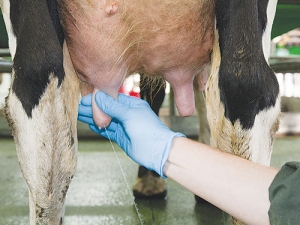Herd testing offers peace of mind
Herd testing, whether it heralds good or bad news, is ultimately good for a farm’s viability and for a farmer's peace of mind.
 Take time with your vet in your milk quality review to look at mastitis treatment records and SCC history.
Take time with your vet in your milk quality review to look at mastitis treatment records and SCC history.
National average somatic cell count (SCC) levels have been dropping recently and are on track to reach a bulk milk SCC of 150,000 cells/ml by 2016.
With this in mind there are seven approaches to dry-cow fine tuning that will enable a farmer to extract maximum value from time and money, says DairyNZ senior scientist Jane Lacy-Hulburt.
1. Choose the right approach for your herd
Antibiotic dry cow treatment (DCT) and internal teat sealants (ITS) are effective tools – DCT for treating infections in high SCC cows, and DCT or ITS for preventing new infections in low SCC cows.
Take time with your vet in your milk quality review to look at mastitis treatment records, SCC history and the mastitis risk of your wintering/calving system.
For information and recommendations on drying off and deciding your dry cow management strategy, visit dairynz.co.nz/dryingoff.
2. Know the bacteria
Knowledge of the bacteria responsible for clinical cases in spring, or high SCC cows in autumn, is invaluable for more cost-effective decisions about dry cow treatments. Discuss with your vet the right cows to sample and refer to DairyNZ’s Healthy Udder guide for sampling procedures.
3. Re-visit your treatment plan
In recent years, many farmers have successfully trialled combination treatments (where a cow received both DCT and ITS). With a lower milk price, farmers may be re-thinking this approach. Support your investment with other preventative measures – see tips 5, 6 and 7.
4. Consider which DCT products for high SCC cows
Talk to your vet about cost-effective solutions for older, higher SCC cows. The difference in cure rates between different product brands is marginal. Cows with a high SCC don’t necessarily need the more expensive treatment.
5. Support your investment decisions using trained staff
Train your team to administer DCT and ITS with correct hygiene technique. Refer to DairyNZ’s Healthy Udder for step-by-step instructions and ask your vet to provide a training session. Poor technique is not worth the risk of dead cows.
6. Teat spray springers before calving
Teat spraying springers two-three times a week reduces the risk of new mastitis cases at calving. This simple technique benefits protected and unprotected animals. Where practical, it may provide a low-cost approach for extending the benefit of some dry cow products.
7. Milk cows soon after calving
Bringing cows that have just calved into milk within 12 hours greatly reduces the level of clinical mastitis. Although tested on heifers, this solution should work well for mature animals also.
• This article was first published in Inside Dairy April 2015
Voting has started for the renewal of DairyNZ's milksolids levy.
The most successful catchment groups in NZ are those that have 'a source to sea' approach.
Associate Agriculture Minister and Manawatu dairy farmer Andrew Hoggard says the free trade agreement (FTA) negotiated with India is not a bad deal and his party, Act, will support it when it goes before Parliament.
Newly released data from Environment Canterbury (ECan) Farm Environment Plan (FEP) audits are showing a dramatic lift in environmental performance across the region.
A solid recovery of global dairy prices this year makes a $9.50/kgMS milk price almost a shoo-in for this season.
As New Zealand marks the United Nations’ International Year of the Woman Farmer 2026 (IYWF 2026), industry leaders are challenging the misconception that women only support farming.
OPINION: Fonterra may be on the verge of selling its consumer business in New Zealand, but the co-operative is not…
OPINION: What does the birth rate in China have to do with stock trading? Just ask a2 Milk Company.